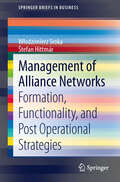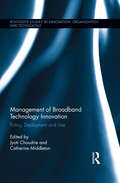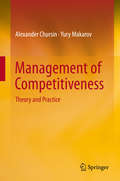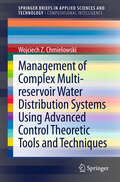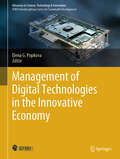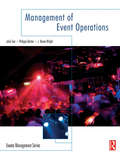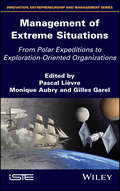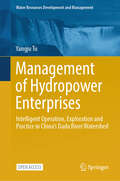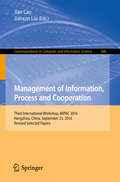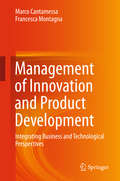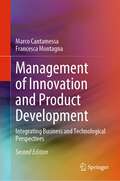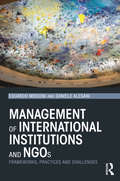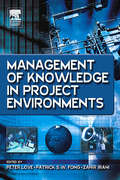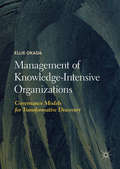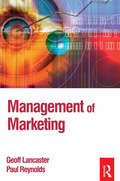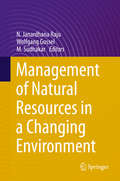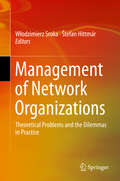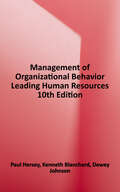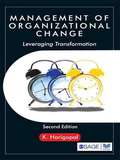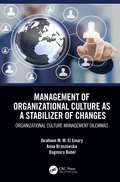- Table View
- List View
Management kreativitätsintensiver Prozesse
by Stefan Seidel Jörg Becker Werner SchwaderlappKreative, innovative Lösungen für sich ständig ändernde Problemstellungen zu entwickeln ist essentiell wichtig für jedes Unternehmen, jede Branche und damit jede Volkswirtschaft. Am Anfang einer jeden Lösung steht ein Prozess - der kreative Prozess. Nur wer die speziellen Eigenschaften solch kreativer Prozesse kennt und auf den Kontext seiner Unternehmung zu beziehen vermag, ist schlussendlich in der Lage, Kreativität richtig zu managen und damit nachhaltigen Erfolg sicherzustellen. Dieses Buch führt am Beispiel kreativer Branchen, wie der Film- und Fernsehindustrie, in die Natur kreativitätsintensiver Prozesse ein, gibt Managementempfehlungen für den Umgang mit diesen und zeigt Möglichkeiten zur methodischen und softwaretechnischen Unterstützung auf. Im Anschluss werden im Rahmen von Praxisbeiträgen Aspekte von und Erkenntnisse aus der TV-Industrie im Detail diskutiert. Schlussendlich werden gewonnene Erkenntnisse konkret auf weitere Branchen übertragen.
Management of Alliance Networks
by Włodzimierz Sroka Štefan HittmárEffective management is crucial to the success of the inter-firm cooperation, and may reduce the risk that is inherently associated with these strategies. If cooperative strategy is to be successful, managers must have knowledge of factors that should be taken into consideration during formation and management of alliance networks. Therefore the main goal of this book is an understandable and simple presentation of the complexity involved in the management of alliance networks at three basic stages: formation stage, functioning stage, and post-operational stage. The book consists of six chapters, both theoretical and practical. A new model for management of alliance networks, which utilizes different instruments and tools, has been developed in the work. The last part of the book concentrates on the management of alliance networks in a practice-based framework based on the example of an engineering company which has formed a portfolio of bilateral alliances.
Management of Broadband Technology and Innovation: Policy, Deployment, and Use (Routledge Studies in Innovation, Organizations and Technology)
by Jyoti Choudrie Catherine MiddletonWhen one considers broadband, the Internet immediately springs to mind. However, broadband is impacting society in many ways. For instance, broadband networks can be used to deliver healthcare or community related services to individuals who don't have computers, have distance as an issue to contend with, or don't use the internet. Broadband can support better management of scarce energy resources with the advent of smart grids, enables improved teleworking capacity and opens up a world of new entertainment possibilities. Yet scholarly examinations of broadband technology have so far examined adoption, usage, or diffusion but missed exploring the capacity of broadband networks to enable new applications, the management aspects of funding and developing broadband-enabled services, or the policy environment in which such networks are developed. This book explores a wide range of issues associated with the deployment and use of broadband including its impacts on individuals, organizations, and society, and offers a generalist understanding of the technical aspects of broadband. Management of Broadband Technology and Innovation offers insights on broadband from the perspectives of Information Systems, Management, Strategy, and Communications Policy scholars, drawing on research from these disciplines to inform diverse aspects of broadband deployment, policy, and use. Issues associated with a subject technical in nature, but now researched in many ways, are emphasised. This book explains various softer aspects of broadband deployment and use, focusing on the benefits of broadband rather than on details of the technology.
Management of Competitiveness
by Alexander Chursin Yury MakarovThis volume of selected articles is being released in light of the new economic, social and environmental challenges Europe and the United States have been faced with following the end of the Cold War and in the evolving era of globalization. National security, immigration and the provision of health and other key social services call for a radically different outlook in terms of policy discussions. The contributors of this book focus on seven key policy issues and challenges that currently affect the United States and Europe: income distribution, the gender pay gap, crime and security, unemployment, health care, the demographic question and environmental regulation. The purpose of this volume is to analyze how public policy within the European context is responding to the challenges posed by this new global era.
Management of Complex Multi-reservoir Water Distribution Systems using Advanced Control Theoretic Tools and Techniques
by Wojciech Z. ChmielowskiThis study discusses issues of optimal water management in a complex distribution system. The main elements of the water-management system under consideration are retention reservoirs, among which water transfers are possible, and a network of connections between these reservoirs and water treatment plants (WTPs). System operation optimisation involves determining the proper water transport routes and their flow volumes from the retention reservoirs to the WTPs, and the volumes of possible transfers among the reservoirs, taking into account transport-related delays for inflows, outflows and water transfers in the system. Total system operation costs defined by an assumed quality coefficient should be minimal. An analytical solution of the optimisation task so formulated has been obtained as a result of using Pontryagin's maximum principle with reference to the quality coefficient assumed. Stable start and end conditions in reservoir state trajectories have been assumed. The researchers have taken into account cases of steady and transient optimisation duration. The solutions obtained have enabled the creation of computer models simulating system operation. In future, an analysis of the results obtained may affect decisions supporting the control of currently existing water-management systems.
Management of Construction Projects: A Constructor's Perspective
by John Schaufelberger Len HolmUnique among construction project management textbooks, Management of Construction Projects, third edition, takes the constructor’s perspective, carefully analyzing a complex, real-world construction case study from multiple angles to demonstrate the skills, knowledge, and techniques students require to become successful project managers. Popular as an undergraduate text and as a contractor resource, the book identifies key stages of the project-management process, such as delivery methods and contracts; estimating, planning, and scheduling; preconstruction services; subcontracting and material management; documentation, communications, and payment; controls, quality, and safety; leadership and ethics; and claims, disputes, and close-out.This third edition includes a novel case study, a new chapter on preconstruction services, updated contract forms and figures, and additional student exercises, and integrates use of project management technology. Topics include building information models, sustainable construction, environmental compliance, lean construction, and off-site construction. Boxed examples, or short case studies, have been included with each chapter. These examples correspond directly to the chapters in which they are included and give the reader an applied approach to learning the concepts presented.While primarily focused on the management of commercial projects, the principles and techniques in Management of Construction Projects also apply to residential, industrial, and heavy construction. Written in straightforward language from a constructor’s perspective, this textbook prepares upcoming construction project managers with everything they need to see a successful project through from start to finish.
Management of Digital Technologies in the Innovative Economy (Advances in Science, Technology & Innovation)
by Elena G. PopkovaThis book is devoted to rethinking the modern theory and practice of digital technology management in the innovative economy through the lens of sustainable development. The book systematises the vectors of the sustainable development of the innovative economy. The progressive practice of digital technologies management in business in support of the sustainable development of the innovative economy is considered. The practice of state management of digital technologies in support of the sustainable development of the innovative economy is studied. The international experience of digital technology management in support of the sustainable development of the innovative economy is discussed. Recommendations for the improvement of digital technology management for the sustainable development of the innovative economy are proposed.
Management of Environmental Problems and Hazards in Nigeria
by H. Chike MbaThis unique collection of essays examines the environmental problems facing contemporary Nigeria. The relationship between environmental degradation and such social issues as poverty and pollution growth has been impressively analyzed. There is also a well-researched discussion on how government and citizens can work towards achieving sustainable development with long-term solutions to ecological disorders. This book provides a valuable resource for academics and professionals in the general area of environmental management as well as those searching for long-term solutions to Nigeria's particular ecological disorders.
Management of Event Operations (Events Management)
by Philippa Norton Julia TumThe Management of Event Operations: project management, planning and customer satisfaction provides an introduction to the management of operations for the event planner and venue provider. Taking an holistic view of an event enterprise, it links the traditional topics within operations management to present a coherent and hands-on approach specifically for the events manager. The approach is pragmatic and is dictated by practical consequences and considerations, which are so important to an event manager who balances many views and needs from diverse stakeholders.
Management of Extreme Situations: From Polar Expeditions to Exploration-oriented Organizations (Leading Works From The French School Of Management Ser.)
by Monique Aubry Gilles Garel Pascal LièvreIn response to the rise of various forms of the extreme in economies, organizations and societies (such as disruptive innovation, climate emergency, financial crisis, high-risk sport, etc.), an ambitious 21st century program sets the agenda of management sciences around the unknown, disruption, uncertainty and risk. Management of Extreme Situations presents the research results from the conference organized at the Cerisy-la-Salle International Cultural Center, France, in 2016. It testifies to the existence of an international community that brings together, around management sciences, various disciplines studying the management concept of extreme situations. Through the analysis of varied contexts (polar and mountain expeditions, fire rescue services, exploration projects in the military field, creative industries, etc.), this book offers an initial grammar of the extreme. It presents a heuristic for the management of these situations – particularly in terms of sensemaking, ambidexterity and knowledge expansion.
Management of Foreign Exchange Risk: Evidence from Developing Economies (Banking, Money and International Finance)
by Sardar M. Islam Y. C. LumThis book provides a technical and specialised discussion of contemporary and emerging issues in foreign exchange and financial markets by addressing the issues of risk management and theory and hypothesis development, which have general implications for finance theory and foreign exchange market management. It offers an in-depth, comprehensive analysis of the issues concerning the volatility of exchange rates. The book has three main objectives. First, it applies the integrated study of exchange rate volatility in terms of depth and breadth. Second, it applies the integrated study of exchange rate volatility in Malaysia, as a case study of a developing country. Malaysia had imposed capital control measures in the past and has now liberalised its exchange rate market and will continue to liberalise it further in the long run. Hence, the need to understand exchange rate volatility measurement and management will be even more important in the future. Third, the book highlights new conditional volatility models for a developing country, such as Malaysia, and develops advanced econometric models which have produced results for sound risk management strategies and for achieving risk management in the financial market and the economy. Additionally, the authors recommend risk management themes which may be of relevance to other developing countries. This work can be used as a reference book by fund managers, financial market analysts, researchers, academics, practitioners, policy makers and postgraduate students in the areas of finance, accounting, business and financial economics. It can also be a supplementary text for Ph.D. and Masters’ students in these areas.
Management of Hydropower Enterprises: Intelligent Operation, Exploration and Practice in China’s Dadu River Watershed (Water Resources Development and Management)
by Yangju TuThis open access book highlights the hydropower potential of the Dadu River watershed in Sichuan province, Southwest China, and an important part of the flood control system for the Changjiang (Yangtze) River. Ensuring the safe, scientific, and economical operation of hydropower stations is the basis for sustainable development for hydropower enterprises and is the foremost task during the process of running and managing hydropower enterprises. Because of the special natural, geographical, and cultural environment in the Dadu River watershed, the operation and management of hydropower enterprises face numerous challenges due to complex hydrometeorology, frequent earthquakes and geological hazards, fragile ecological environment, and difficult conditions for production. In order to effectively resolve the many challenges on the Dadu River in terms of reservoir group operational control, power station group power dispatch, operation and inspection of equipment for the whole watershed, operation of multiple power station hydraulic structures, and watershed enterprise management, the multiple power stations in the Dadu River watershed adhere to the concept of innovative development and actively embrace advanced technologies such as cloud computing, big data, Internet of Things (IoT), and artificial intelligence. In 2014, the Dadu River Company was the first in the corporate world to put forward the dream and approach for the construction of the intelligent enterprise, while boldly carrying out exploration and practice in intelligent operations and management in the Dadu River watershed.
Management of Information, Process and Cooperation
by Jian Cao Jianxun LiuThis book constitutes the refereed proceedings of the Third International Workshop on Management of Information, Process and Cooperation, MiPAC 2016, held in Hangzhou, China, in September 2016. The 8 revised full papers were carefully reviewed and selected from 14 submissions. The papers are organized in topical sections on process modeling, process enactment, and data driven service computing.
Management of Innovation and Product Development
by Marco Cantamessa Francesca MontagnaPresenting an integrated and holistic perspective on innovation management and product design and development, this monograph offers a unique and original understanding of how these two perspectives are interconnected. This book explores these themes in a scientifically rigorous manner, associating academic findings with examples from business. It provides readers with the conceptual and decision-making tools required to understand and manage the process of innovation at different levels, from the analysis of industry-wide phenomena to the formulation of a strategy and from the planning of operations to the management of technical choices. Chapters cover innovation as an economic and social phenomenon, the formulation of innovation strategy, the management of product development processes and projects and the technical design of products and services. Offering an invaluable resource to postgraduate students in economics, business and engineering, this book is also intended for managers and entrepreneurs.
Management of Innovation and Product Development: Integrating Business and Technological Perspectives
by Marco Cantamessa Francesca MontagnaThis textbook provides a unique and original understanding on innovation and on product design and development, and on their tight interconnections. It presents an integrated and holistic perspective on these two fields, allowing readers to understand how the phenomenon of innovation occurs – and must be managed – at different and interacting levels, from corporate strategy to design decision-making.This book explores these themes in a scientifically rigorous manner, associating academic findings with examples from business. It provides readers with the conceptual and decision-making tools required to understand and manage the process of innovation at different levels, from the analysis of industry-wide phenomena to the formulation of a strategy, and from the planning of operations to the management of technical choices. Chapters cover innovation as an economic and social phenomenon, the formulation of innovation strategy, the management of product development processes and projects and the technical design of products and services. Offering an invaluable resource to postgraduate students in economics, management and engineering, this book is also intended for managers and entrepreneurs.The book's topics are covered by associating academic findings with examples from business. For this new second edition of the book, case studies are made available through a companion LinkedIn page that is continuously updated by authors and by readers, while pointers to complementary content available on the internet are provided throughout the text.
Management of International Institutions and NGOs: Frameworks, practices and challenges
by Eduardo Missoni Daniele AlesaniInternational Institutions (IIs), International NGOs (INGOs) and Transnational Hybrid Organizations (THOs) play a hugely important role in the modern world economy. Despite having been studied by scholars from a range of disciplines, these organizations have never before been approached from a management perspective. This ambitious book analyzes the management challenges associated with international cooperation and sheds light on how these organizations have evolved as the political, economic and business environments have changed around them. Covering an admirably broad canvas, the authors pursue two main objectives. Firstly, they explore the main management frameworks developed in the context of the corporate and national public/non-profit organizations and adapt them to the specificity of IIs and INGOs. This leads to the identification of a "tailored" approach to IO management based on their institutional and operational settings, stakeholder groups, core business, staff profile, and financial arrangements. Secondly, they "bring theory into practice" by linking frameworks to several case studies and best practices of organizations currently experimenting with management systems and tools, with case studies including the World Bank and the Gates Foundation. This comprehensive textbook is a must-own resource for students and academics involved with studying and working with international organizations.
Management of International Institutions and NGOs: Insights for Global Leaders
by Eduardo Missoni Daniele AlesaniThis second edition of Management of International Institutions and NGOs covers all key topics in global governance from a unique management perspective. It analyzes the management challenges associated with international cooperation rather than the more commonly explored political or economic lenses. This text is structured to enable students to connect theory with practice, beginning with the main management frameworks developed in the context of corporate and national public/nonprofit organizations and adapting them to the specificity of international institutions and international non-governmental organizations. This leads to the identification of a “tailored” approach to international organization management based on their institutional and operational settings, stakeholder groups, core business, staff profiles, and financial arrangements. The authors then connect this theory with practice by linking frameworks to several case studies and best practices of organizations currently experimenting with management systems and tools, with case studies including the World Bank and the Gates Foundation. This edition has been extensively revised and updated, with an expanded conceptual framework inclusive of systemic theories of organization, new cases throughout, and new chapters on leadership, supply chain and operations, and human-centered digitization. This comprehensive textbook is a must-own resource for students and academics involved with studying and working with international organizations.
Management of Knowledge in Project Environments
by Peter E. D. Love Patrick S.W. Fong Zahir IraniManagement of knowledge in project environments is a unique text that brings together contributions from leading academic practitioners, to demonstrate how the management of knowledge can lead to project success in today's complex and changing business environment.The work examines how the management of knowledge, particularly the sharing of knowledge and the importance of learning through reflection, can lead to project success and improved business performance. This book is written by an international contributor team and offers practical applications, models and case studies from a variety of international perspectives.
Management of Knowledge-Intensive Organizations: Governance Models For Transformative Discovery
by Ellie OkadaThis book focuses on enhancing management theories of Knowledge-Intensive Organizations (KIOs), analyzing academic and research institutions and multilateral agencies such as the World Health Organization (WHO). The first part of the book discusses the trusteeship norms of academic KIOs and institutional barriers that generate bias in selecting the research agenda. The author then discusses how moral stakeholders affect a legitimate research scope, and research policies and academic KIOs address the issues. Finally, the book addresses how to control private incentives that stem from ownership components as well as ways to build alliance and governance mechanisms for this purpose. This work provides researchers with a discussion of the broader impacts of addressing global common goods from responsible KIO perspectives.
Management of Marketing
by Paul Reynolds Geoff LancasterThe text provides information on the core elements of the subject of marketing without the depth that often surrounds these to ensure that the basic concepts are easily identifiable and accessible. Students on MBA courses often do not have time to read a long text as they are studying many subjects, therefore they require a good, basic guide pitched at the appropriate level to be able to be absorbed quickly but still provide enough of a strategic element to stretch them.Written by a successful author team, Management of Marketing covers the key topics of the marketing component of an MBA course and provides a good balance of theory and application to ensure both aspects of the core concepts are covered.
Management of Natural Resources in a Changing Environment
by N. Janardhana Raju Wolfgang Gossel M. SudhakarThis book addresses issues related to sources of groundwater pollution such as arsenic, uranium, fluoride and their effects on human health. It discusses extensively the removal of heavy metals, arsenic and fluoride from drinking water. Bioremediation and phyto remediation on biomass productivity are treated in several chapters in the book. The volume highlights leachate characteristics analysed both in the laboratory and in field studies assessing the trace metals in rainwater. This book is a study on the judicious management of natural resources and exposes environmental problems particularly those related to pollution and bioremediation.
Management of Network Organizations
by Włodzimierz Sroka Štefan HittmárEffective management is crucial to the success of network organizations and can reduce the risk inherently associated with cooperative strategy. This contributed volume addresses the management of network organizations from both theoretical and practical perspectives, as well as an international standpoint in the form of selected cases from various Central European countries. The authors claim that without some type of network management, irrespective of the type of network, it is impossible to effectively compete with other companies and/or networks. As network organizations are representative of a broad range of possible network types, i. e. alliance networks, clusters, outsourcing, and virtual organizations, this book presents various perspectives on the management of network organizations. The book features articles from different scholars who have practical experience in network organizations, written in simple and easy-to-follow language, with a wide application of practical cases. Given its successful combination of theory and practice, together with the nature of the texts presented, the book offers a valuable resource for a broad readership, including scholars, managers and management science students.
Management of Organizational Behavior: Leading Human Resources
by Kenneth Blanchard Paul Hersey Dewey JohnsonForty years in the making, Management of Organizational Behavior is a readable text that makes behavioral sciences come alive through real-life examples and progressive ideology.
Management of Organizational Change
by K HarigopalOrganizational Change is a complex yet essential process for growth and development in business. The second edition of this insightful book examines the nature of this critical process in the light of the rapid changes in the business environment and intense global competition. The author revisits fundamental concepts, as well as presents new ideas, activities, and processes associated with how to plan, implement and manage effective transformational change. The book highlights: - The nature and process of transformational change and the paradigms basic to the change process - The basic concepts and strategic leverages of change - The need for and ways of aligning current tasks, systems, processes, and culture with organizational goals - The support systems required for change and the need to develop and maintain these systems - Ways of tuning organizations for change - Managing change through people by optimizing individual and group efforts Supported by numerous case studies and written in a lucid and reader-friendly style, this book will be a definitive guide for students, scholars, and practitioners.
Management of Organizational Culture as a Stabilizer of Changes: Organizational Culture Management Dilemmas
by Ibrahiem M. El Emary Anna Brzozowska Dagmara BubelNo enterprise today is proud of being unchanged. Stability is understood more as a sign of stagnation than reliability, and enterprises that do not change and do not evolve are commonly regarded as fossilized. Increasing globalization processes often force today’s enterprises to make organizational changes, but the effectiveness of these processes relies on its organizational culture. This book argues that the problem behind organizational culture is its multilevel structure, including the visible and hidden levels. It addresses difficult questions, such as: Is it better to make thorough, but more painful changes, or to gradually introduce small improvements? It also demonstrates that organizational culture is not a fixed phenomenon: its shaping takes place in stages, and it is essential to take such stages into account in the process of implementing the strategy of an enterprise. Providing a comprehensive insight into "organizational culture" and its relationship to change, this book will be essential reading for professionals involved in business management and IT management throughout the world. Its analyses and suggestions will allow for improved organizational culture and change management in business environments.

